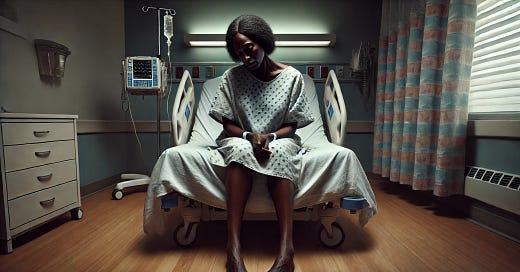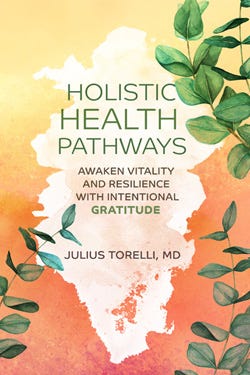The Patient Who Taught Me What Medical School Couldn't
"The good physician treats the disease; the great physician treats the patient who has the disease."—Dr. Sir William Osler
Medical school taught me how to diagnose, treat, and categorize physical illness. It drilled into me the importance of science, data, and clinical reasoning. It took me decades to fully understand Dr. Osler's point.
The Patient Who Changed Everything
It was 1986. It was the last week of my last medical school rotation. I was working at a small Family Medicine office. My training in the office involved evaluating new patients with a history and physical examination, then presenting my findings to my supervising physician, Dr. Seahouse.
That's when I met Ms. Williams, a black middle-aged woman who was visibly exhausted. Not the kind of tired that comes from an awful night's sleep, but the kind of tired that is deep in your bones. Despite her sallow, drained appearance, she came across as dignified. She had been nauseous with vomiting and dry heaves for three days, unable to keep anything down.
After a routine exam, I presented her case to Dr. Seahouse. He listened, then in a slow, deliberately mocking tone, asked, "So… DOCTOR… what's your diagnosis?"
The way he stretched out the word "doctor" made it clear he knew I had no idea what was wrong with her. I told him I wasn't sure.
"So, what do you want to do?" he continued, his tone dripping with condescension.
I knew she was dehydrated. I suggested admitting her to the hospital for IV fluids and further testing. He nodded and walked away. No praise, no critique—just an unspoken expectation that I figure it out.
When Medicine Comes Up Empty
Over the next three days, every test came back normal. There was no infection, no organ dysfunction, no obvious cause for her symptoms, which had improved over that time.
My first lesson that day was frequently we do not find a physical cause for a patient's symptoms or illness.
After seeing the negative test results, Dr. Seahouse told me to go discharge her, then meet him at the office. I turned to follow his instructions, but stopped halfway down the hall. Discharge her with what diagnosis? I thought to myself.
I spun around and called after him, "What do I put as her discharge diagnosis?"
Without hesitation, he replied, "Viral gastroenteritis," as he walked out the door.
My second lesson, when you have no clue what's wrong, slap "-itis" at the end of a body part or organ and blame a virus.
The Moment That Opened My Eyes And Left Me Bewildered
I entered her room, ready to give her the good news.
"All your tests are normal. You're free to go," I announced as I sat to write her discharge orders. "I'm going to discharge you so you can go home and get some proper rest."
"Oh, I wish," she murmured, sitting on the edge of the bed staring at the floor.
Her response caught me off guard. I hesitated, not knowing how to respond to her unanticipated statement.
She remained still, her gaze fixed on the floor, biting her bottom lip, trying to decide if she could trust me.
"Why can't you go home?" I finally asked.
She slowly lifted her head, took a deep breath in, and slowly let it out through pursed lips, her cheeks puffing out before deflating.
She looked directly at me and finally spoke. "Well, in the last six weeks, my husband left me, my dog died, and my house burned down."
Silence filled the room. I sat speechless. I took a deep breath, trying to hold back the tears that filled my eyes.
My medical training had taught me to listen to a patient's symptoms, conduct thorough physical examinations, and analyze clinical data. But nothing had prepared me for this.
It hit me like a gut punch—her body wasn't failing her. Her life was.
The Diagnosis We Always Miss
Medical school didn't teach me how emotions like grief manifest in the body. It didn't teach me that overwhelming stress can make a person physically ill. It didn't teach me that sometimes, a patient doesn't need a prescription for a drug—they need someone to acknowledge their pain, hear them, and support them.
Ms. Williams didn't need more tests. She needed a safe space, support, and a friend.
A Lesson That Took Years to Sink In
All I could do was sit with her in silence. I didn't have the words, the wisdom, or the experience to help her beyond my presence. But I never forgot her.
Over the years, I saw versions of Ms. Williams everywhere.
People walk into doctors' offices every day with unexplained symptoms-headaches, stomach pain, chest pain, palpitations, fatigue, dizziness. We examine, scan, and test. When results come back normal, we dig deeper, running even more tests.
Often, there's no clear physical cause.
And yet, their suffering is real, sometimes debilitating.
Emotions cause the release of hormones and neurotransmitters that affect physiology. Emotional stress can lead to physical abnormalities. In cardiology, there is a well-documented condition called Takotsubo Cardiomyopathy, also called "Broken Heart Syndrome" or "Stress Cardiomyopathy" where the heart muscle becomes severely weakened. The condition is more common in women and is triggered by intense emotional stress, such as loss of a loved one.
As physicians, we have access to remarkable advancements in medical technology. In our pursuit of innovation, we risk losing sight of the timeless wisdom that once defined the art of medicine.
Sir William Osler, often regarded as the "Father of Modern Medicine", understood that true medical mastery goes beyond diagnostics and treatments—it lies in seeing and treating the whole person.
As he put it, "It is much more important to know what sort of patient has a disease than what sort of disease a patient has." His insights remain just as relevant today as ever, reminding us that while technology continues to evolve, the human element of medicine is critical.
Not all illnesses show up in bloodwork. Not all pain can be measured. And sometimes, the best medicine has nothing to do with medicine at all.
Important Points:
🔹 Medical training prioritizes the physical over the personal. Medical training focuses on diagnosing and treating physical conditions, but healing often requires acknowledging the full human experience.
🔹 Emotions and stress can manifest physically. Ms. Williams' story illustrates how grief and overwhelming life stress can cause real, debilitating physical symptoms.
🔹 Your body keeps score. Stress, grief, and trauma don't just affect your emotions—they take a toll on your physical health.
🔹 Not all diagnoses come from a lab. Just because medical tests don't reveal a physical issue doesn't mean your pain isn't real.
🔹 Healing isn't only about pharmaceuticals. Addressing mental health is often the missing piece to healing. Integrating mental health care, including referrals to mental health professionals, should be a standard part of the treatment of medically unexplained symptoms.
A Question for You
Have you ever experienced physical symptoms that turned out to be rooted in stress or emotional pain? How did you navigate it?
Final Thought:
Medical school trained me to treat disease. Experience taught me to heal people.
In the coming weeks, I’ll be sharing simple, actionable tips to help you build a mindset that supports your health and happiness. Together, we’ll explore what it really means to Live Gratefully Well—not just in theory, but in daily life.
I will be hosting a free webinar in March to describe the program and process. I will also be setting up a free 3 -4 week webinar coaching group session. Follow me here on Substack to receive notifications and more information about the webinar.
Head over to GratefullyWell.com and join the 7-Day Gratitude Challenge.
Check out my new book on Intentional Gratitude: Holistic Health Pathways: Awaken Vitality & Resilience With Intentional Gratitude available on Amazon.
So, welcome! I’m grateful to have you here, and I can’t wait to hear your story.
Until next time, stay grateful and stay well.
Julius Torelli, MD
Founder, Gratefully Well
P.S. What’s your biggest challenge in staying healthy and happy? Hit reply and let me know—I’d love to hear from you and shape this newsletter to help you best.
Check out my book on the Physical and Mental Health Benefits of Gratitude:
Holistic Health Pathways: Awaken Vitality & Resilience With Intentional Gratitude







"It is much more important to know what sort of patient has a disease than what sort of disease a patient has."
What a wonderful quote. Too often we ignore the human element, not just in medicine, but in the everyday situations that we face. People have deep, deep lives, and whatever happens behind the facade impacts them greatly. We must remember to look beyond the surface and see what's happening within.
Truly no surprise this manifests in the medical field as well.
Thank you for sharing this. I agree -
feeling we are so stuck in the texts and guidelines and catching the snapshot of the person instead of trying to see the big picture. Really good read!